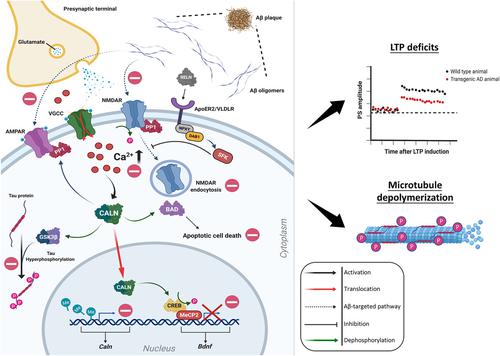当前位置:
X-MOL 学术
›
Ann. N. Y. Acad. Sci.
›
论文详情
Our official English website, www.x-mol.net, welcomes your
feedback! (Note: you will need to create a separate account there.)
DNA methylation in the pathology of Alzheimer's disease: from gene to cognition
Annals of the New York Academy of Sciences ( IF 4.1 ) Pub Date : 2020-06-03 , DOI: 10.1111/nyas.14373 Chi Him Poon 1 , Long Sum Rachel Tse 1 , Lee Wei Lim 1
Annals of the New York Academy of Sciences ( IF 4.1 ) Pub Date : 2020-06-03 , DOI: 10.1111/nyas.14373 Chi Him Poon 1 , Long Sum Rachel Tse 1 , Lee Wei Lim 1
Affiliation

|
Alzheimer's disease (AD) is a debilitating disorder that manifests with amyloid beta plaque deposition, neurofibrillary tangles, neuronal loss, and severe cognitive impairment. Although much effort has been made to decipher the pathogenesis of this disease, the mechanisms causing these detrimental outcomes remain obscure. Over the past few decades, neuroepigenetics has emerged as an important field that, among other things, explores how reversible modifications can change gene expression to control behavior and cognitive abilities. Among epigenetic modifications, DNA methylation requires further elucidation for the conflicting observations from AD research and its pivotal role in learning and memory. In this review, we focus on the essential components of DNA methylation, the effects of aberrant methylation on gene expressions in the amyloidogenic pathway and neurochemical processes, as well as memory epigenetics in Alzheimer's disease.
中文翻译:

阿尔茨海默病病理学中的 DNA 甲基化:从基因到认知
阿尔茨海默病 (AD) 是一种使人衰弱的疾病,表现为β淀粉样斑块沉积、神经原纤维缠结、神经元丢失和严重的认知障碍。尽管已经做出很多努力来破译这种疾病的发病机制,但导致这些有害结果的机制仍然不清楚。在过去的几十年里,神经表观遗传学已经成为一个重要的领域,其中包括探索可逆修饰如何改变基因表达以控制行为和认知能力。在表观遗传修饰中,DNA 甲基化需要进一步阐明 AD 研究中相互矛盾的观察结果及其在学习和记忆中的关键作用。在这篇综述中,我们关注 DNA 甲基化的基本组成部分,
更新日期:2020-06-03
中文翻译:

阿尔茨海默病病理学中的 DNA 甲基化:从基因到认知
阿尔茨海默病 (AD) 是一种使人衰弱的疾病,表现为β淀粉样斑块沉积、神经原纤维缠结、神经元丢失和严重的认知障碍。尽管已经做出很多努力来破译这种疾病的发病机制,但导致这些有害结果的机制仍然不清楚。在过去的几十年里,神经表观遗传学已经成为一个重要的领域,其中包括探索可逆修饰如何改变基因表达以控制行为和认知能力。在表观遗传修饰中,DNA 甲基化需要进一步阐明 AD 研究中相互矛盾的观察结果及其在学习和记忆中的关键作用。在这篇综述中,我们关注 DNA 甲基化的基本组成部分,











































 京公网安备 11010802027423号
京公网安备 11010802027423号